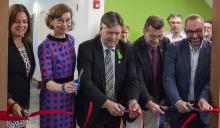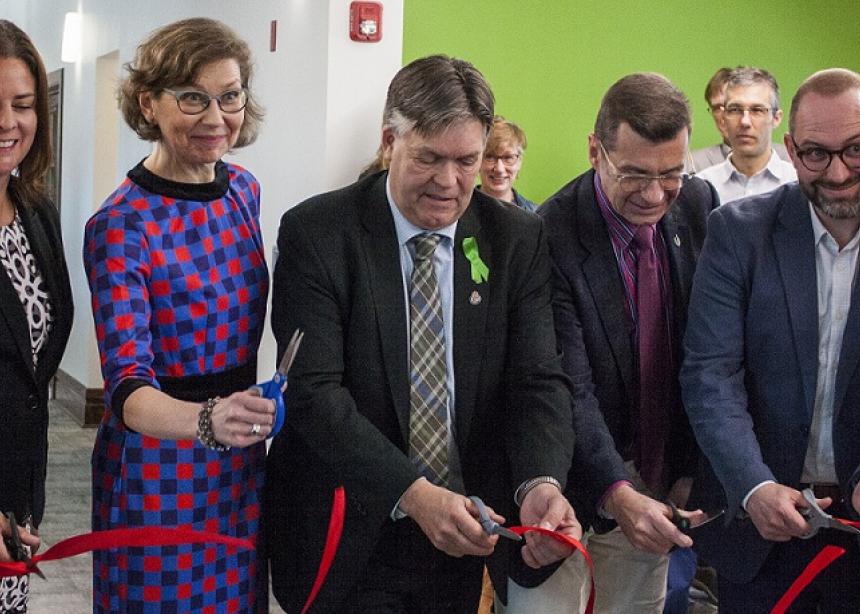Faculty, students and staff celebrated the grand opening of the $1.7-million Centre for Resilience (CFR)—a co-working lab that will incubate and nurture social enterprises—on April 13, 2018.
“We’re thankful for the opportunity to create a space designed to meet the needs of the 21st century,” said James Magnus-Johnston, director of the centre. “The CFR will maximize the impact of social entrepreneurs, and allow students to work on complex, real-world problems.”
The CFR’s work links with CMU’s teaching, scholarship and other activities, said Cheryl Pauls, the university’s president. These links will be found in many areas of study, including environmental studies, business and social innovation. “Our hope is that the CFR will inspire students, faculty and others who connect through CMU to be good stewards of God’s creation, competent and willing to blend patience and urgency, courage and inventiveness in all we are and do,” she added.
A handful of organizations have already signed on to join the CFR.
Magnus-Johnston is excited about the possibilities for the CFR, where businesses and non-profit organizations can work together at social and ecological challenges.
“That’s where the joy is,” he said of the interplay that can happen between CFR stakeholders. “As a university, we should be able to experiment with new ideas, and if you think of faith as action in spite of the completely knowable—action in spite of uncertainty—all of these things are acts of faith in that regard.”
The CFR’s goal is to develop policy, design and enterprise innovations for a resilient economy that improves social equity and environmental protection.
“I have a love/hate relationship with the word ‘innovation,’” he said. In trying to make sense of how the CFR will be innovative, he went back to the Latin meaning of the word. To be innovative means to do something in a new way.
Social and ecological problems like climate change, social inequality, the emergence of a new kind of radicalism and fundamentalism in mainstream culture, and First Nations’ water scarcity all put constraints on the way society needs to move forward, according to Magnus-Johnston. He said, “What’s beautiful about this is, when you recognize the constraints as real problems, then you start to work at them in new ways—in innovative ways.”
He added that CMU has the potential to make an impact on the church and community with the Centre. As a community of followers of Christ, people at CMU aren’t afraid to look at the problems facing the planet, imagine a better world, take a risk, trust in something greater than themselves and work toward solutions: “We’re not afraid of putting things back together again.”
Pauls agrees. At its core, she said that the Centre is committed to nurturing resilience.
“Resilience is about remaining true to what matters most, even when various aspects of an organization or activity take on new forms and look very different from before,” she said. “In theological terms, resilience is a way to talk about faithfulness before God through a time of disruption and change in the church, and also in other spheres of our lives.”
Attending to the word “innovation” gives voice to yearnings that disruptions and changes will not lead to despair and destruction, but rather to new manners of flourishing.
“At CMU, a university moved and transformed by the life and teachings of Jesus Christ, innovation is about new ways of being present to God’s ongoing transformation of the world,” she concluded.

The ceremonial ribbon cutting at the April 13, 2018, grand opening of the Centre for Resilience at CMU. From left to right: Heather Stephanson, Manitoba’s minister of justice and attorney general; Cheryl Pauls, CMU’s president; Ian Wishart, Manitoba’s education and training minister; Doug Eyonlfson, MP for Charleswood-St. James-Assiniboia-Headingley; and James Magnus-Johnston, director of the Centre for Resilience. (Canadian Mennonite University photo)


Add new comment
Canadian Mennonite invites comments and encourages constructive discussion about our content. Actual full names (first and last) are required. Comments are moderated and may be edited. They will not appear online until approved and will be posted during business hours. Some comments may be reproduced in print.